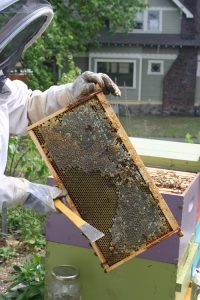I’m actually allergic to bees,” chuckles Spokane beekeeper Kimberlee Kealiher, who simply packs an EpiPen and keeps on humming. This is Kealiher’s fourth year keeping bees in the backyard of her South Hill home, and her love and respect for the insect are apparent. “After keeping chickens successfully, I was looking for a new hobby,” Kealiher explains. “A friend loaned me the book ‘Plan Bee’ by Susan Brackney, and I immediately knew I wanted to be a beekeeper.”
Hobbyists often become interested in beekeeping for two reasons, says Ari Alvarez, owner of BeeManiacs, a beekeeping supply store in Deer Park: to help the bees, and to help their gardens. Bees have made news lately with their plummeting numbers due to a problem called colony collapse disorder (CCD), which is likely caused by pesticides. In fact, last month, two hives of 30,000 honeybees were installed on the grounds of the Washington state governor’s mansion to raise awareness of the issue. “Simply put: no bees, no food,” says Joan Nolan, a master beekeeper with the Inland Empire Beekeepers Association. “The silver lining to CCD is that more people are aware of how critical the honey bee is for pollination.”

Increased awareness of the plight of the humble bee has also caused a shift in beekeeper demographics, notes Alvarez. “Ten years ago, beekeepers were mostly men over 50. As more hobby-friendly beekeeping associations and classes are made available, we are seeing far more women ages 20 to 40, usually with kids. This change is making beekeeping a sustainable activity.” Beekeepers celebrate the family-friendly nature of their hobby. “We started beekeeping when our kids were 9 and 10,” says Alvarez. “Beekeeping became a family thing. Our kids even named our company, and we all contribute our skills.” Ellen Miller, Vice President of the West Plains Beekeepers Association, agrees that beekeeping is great for kids. “More children are taking our beginning beekeeping classes, and they’re frequently the most eager participants,” Miller says. “Many children have learned about honeybees in school and are ready to learn more.”
New or aspiring beekeepers will receive a warm welcome at any of the associations in the area (see sidebar), where they can learn about the costs (new beekeepers will spend about $500 for a bee suit, tools, equipment, and the actual hive and bees), time involvement (beekeeping is a year-long process), and regulations involved with beekeeping. Kimberlee Kealiher recommends finding someone who’s a beekeeper and tagging along when they check their hives. “I can’t imagine beekeeping without being a part of a local association!” Kealiher says. “Membership in a local association facilitates relationships with experienced beekeepers who can mentor and pass along knowledge to newer beekeepers. Local associations provide a place to seek advice, learn from mistakes, and discuss new ideas and techniques.”
Beekeepers Associations and Classes
The Inland Empire Beekeepers Association, Spokane
- Active membership: 100 members
- Monthly meetings: Second Friday of every month at the WSU Spokane Extension
- Beginner’s classes: February, $50 per person
- Website: www.inlandempirebeekeepersassociation.com
The West Plains Beekeepers Association, Cheney/Medical Lake
- Active membership: 120 members
- Monthly meetings: Third Friday of every month at Pizza Factory in Medical Lake
- Beginner’s classes: Early spring and late fall, $35 per household
- Website: www.wpbeekeepers.org
The Backyard Beekeepers Association, Deer Park
- Active membership: 35-40 members
- Monthly meetings: Third Thursday of every month at Deer Park City Hall
- Beginner’s classes: March and October, $30 per person
- Website: www.newbeekeepers.us













